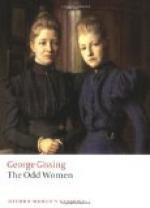Two days went by, and again a letter from Widdowson was delivered,
’DEAR MISS MADDEN—My chief purpose in writing again so soon is to apologize sincerely for my behaviour on Tuesday evening. It was quite unjustifiable. The best way of confessing my fault is to own that I had a foolish dislike of your walking in the streets unaccompanied at so late an hour. I believe that any man who had newly made your acquaintance, and had thought as much about you as I have, would have experienced the same feeling. The life which made it impossible for you to see friends at any other time of the day was so evidently unsuited to one of your refinement that I was made angry by the thought of it. Happily it is coming to an end, and I shall be greatly relieved when I know that you have left the house of business.
’You remember that we are to be friends. I should be much less than your friend if I did not desire for you a position very different from that which necessity forced upon you. Thank you very much for the promise to tell me how you like the new employment and your new friends. Shall you not henceforth be at leisure on other days besides Sunday? As you will now be near Regent’s Park, perhaps I may hope to meet you there some evening before long. I would go any distance to see you and speak with you for only a few minutes.
’Do forgive my impertinence, and believe me, dear Miss Madden.— Ever yours,
EDMUND WIDDOWSON.’
Now this undoubtedly might be considered a love-letter, and it was the first of its kind that Monica had ever received. No man had ever written to her that he was willing to go ‘any distance’ for the reward of looking on her face. She read the composition many times, and with many thoughts. It did not enchant her; presently she felt it to be dull and prosy—anything but the ideal of a love-letter, even at this early stage.
The remarks concerning Widdowson made in the bedroom by the girl who fancied her asleep had greatly disturbed her conception of him. He was old, and looked still older to a casual eye. He had a stiff dry way, and already had begun to show how precise and exacting he could be. A year or two ago the image of such a man would have repelled her. She did not think it possible to regard him with warm feelings; yet, if he asked her to marry him—and that seemed likely to happen very soon—almost certainly her answer would be yes. Provided, of course, that all he had told her about himself could be in some satisfactory way confirmed.
Her acquaintance with him was an extraordinary thing. With what amazement and rapture would any one of her shop companions listen to the advances of a man who had six hundred a year! Yet Monica did not doubt this truthfulness and the honesty of his intentions. His life-story sounded credible enough, and the very dryness of his manner inspired confidence. As things went in the marriage war, she might esteem herself a most fortunate young woman. It seemed that he had really fallen in love with her; be might prove a devoted husband. She felt no love in return; but between the prospect of a marriage of esteem and that of no marriage at all there was little room for hesitation. The chances were that she might never again receive an offer from a man whose social standing she could respect.




